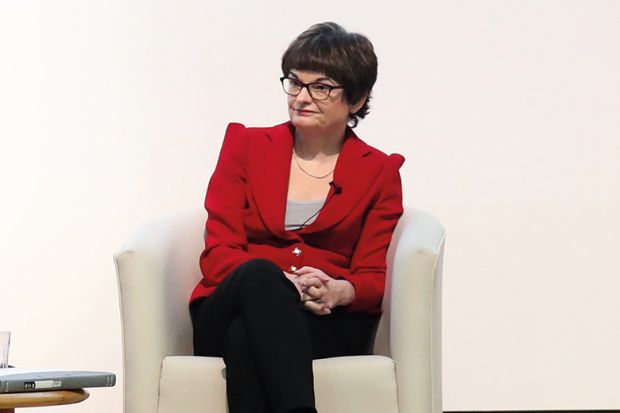The Westminster government’s rebuff on English university funding is not “the end of the conversation” because there is an urgent need to consider the cost balance between individuals, the government and “potentially employers”, while a review would risk “pushing things off”, according to the Universities UK president.
As English university funding declines amid a long-running tuition fee cap freeze while Scottish, Welsh and Northern Irish universities also see funding constrained, Dame Sally Mapstone’s speech at the UUK conference in September saw her make a significant intervention, calling for a “potential rebalancing of who pays for the costs of higher education”, recognising that its benefits are “neither wholly public nor private”.
At the same conference, in her on-stage interview with the higher education minister, Robert Halfon, he repeated his warning, initially made in an interview with Times Higher Education, that raising the tuition fee cap during a cost-of-living crisis was “just not going to happen, not in a million years”.
What did she make of that message?
It was “very decent of [Mr Halfon] to turn up”, a step to “building relationships, having conversations, getting people to explore a different point of view”, Dame Sally, the University of St Andrews principal, told THE after taking up her two-year UUK post in August.
“But I don’t see that as the end of the conversation,” continued the former University of Oxford pro vice-chancellor for education. “I think it’s the responsibility of universities to acknowledge the situation that we’re in.”
Also highlighting a pressing need to address student maintenance funding, Dame Sally said UUK would not “offer up an absolute programme” for funding change, because governments current and future would have to evaluate “and decide whether they want to move some of those [funding elements] around as I said, rebalance – or whether they think that they want to attempt something more radical, which in my opinion would just push things down the road for a few more years”.
“I never like the term ‘tweaking’ – partly because I think it sounds like ‘twerk’ – but tweaking suggests a sort of impermanent adjustment,” she added. “And actually, I think we need something more thoughtful and sustained that’s the product of dialogue and talking things through.”
A review is seen by many in the sector as the best route to achieving change.
But Dame Sally said: “The risk with a review is that enables people to push things off for a couple of years while you set up a review group and then give it time to do its work.”
On rebalancing, she said: “We need to look at the relationship between what the individual pays, what the government pays and, potentially, what employers contribute – those are the key moving parts.”
In terms of Dame Sally’s background, grammar school in west London was followed by a degree in English at Wadham College, Oxford, then a job in publishing, a doctorate at Oxford and an academic career focused on medieval Scottish literature. Dame Sally described her time at Oxford as “genuinely transformative” and “completely disruptive of my established ways of seeing”, one factor in why “I’ve always been so keen on widening access” to higher education.
But ministers, including the prime minister, argue that there is plenty of “low-value” English higher education that is not transformative.
Dame Sally said it was “absolutely crucial when talking about quality not to define everything in terms of poor quality, but to acknowledge and celebrate good quality where you find it; and acknowledge and deal with poor quality if you find it in a small number of places”.
The key was to be “encouraging [potential students] to aim high, showing them the range of opportunities universities can offer them, rather than banging on about a small number of courses”, she added.
Dame Sally made curious headlines earlier this year and was branded “cantankerous” after The Sunday Times reported that a St Andrews international relations academic detected a Russian state hacking attempt when an email reached him, purportedly from a colleague, using a phrase Dame Sally had forbidden on arrival at the university in 2016. She had, it said, told colleagues “they must never start an email with ‘I hope this finds you well’, never end one with the sign-off ‘I trust you find this useful’, and they should never wear corduroy to work”.
Did literal-minded journalists miss her humorous intent? Or does she just really hate corduroy? “I always hope I can get through an interview without the ‘c’ word being used,” deadpanned Dame Sally.
Nevertheless, she did confirm her “abhorrence” of the email phrase “I hope this helps” (“totally meaningless – what it means is ‘I know this doesn’t help, but that’s all you’re getting from me at the moment’”) and her strong view that “corduroy is for gardening, essentially”.




